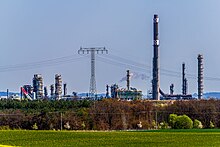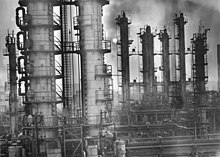PCK refinery
The PCK refinery is an oil processing plant in Schwedt / Oder in the Uckermark (Brandenburg). The PCK refinery in Schwedt supplies 95 percent of the Berlin and Brandenburg areas with fuels, i.e. gasoline , diesel , jet fuel and heating oil . The market share in total German fuel production is around ten percent. The acronym PCK stood until 1991 P etrol c hemisches K ombinat 1991 to 1996 P etrol c hemie and K raftstoffe .
operator
The refinery is held and operated by PCK Raffinerie GmbH , a joint venture between Rosneft Deutschland GmbH (37.5%), Shell Deutschland Oil (37.5%) and AET-Raffineriebeteiligungsgesellschaft Schwedt ( Eni , RN Refining & Marketing) (25 %) for which it works as a contract processor.
Employee
1200 employees work for the PCK refinery; 30 percent of the employees are female. 80 other companies with 2000 employees are located on the premises of the refinery, many of whom work as service providers for the PCK refinery.
Transport links and logistics
The crude oil from the West Siberian region has been transported since December 1963 via the approx. 5000 km long friendship ("Druzhba") oil pipeline , which is one of the largest in the world in terms of length and production capacity. The crude oil needs around three weeks to cover the 5000 km route.
A 202 km long Rostock –Schwedt oil pipeline (commissioned in 1969) also supplies the refinery with crude oil. Via a product line (1967, 78 km), three million tons of fuel are pumped into the PCK & elf tank farm Seefeld (PETS) every year. From here, tank trucks (TKW) supply the entire Berlin area.
Six million tons of products leave the refinery by rail every year. The works station is connected to the Berlin – Szczecin line via a branch line . PCK supplies Berlin-Schönefeld Airport with 80 percent jet fuel via tank cars. The Berlin-Tegel Airport is powered 100 percent by tank truck. In recent years, the B 2 and the B 166 have been significantly expanded, so that the tanker trucks from Schwedt can now get by with fewer through-roads on the way to the A 11 and A 20 motorways .
production
The PCK refinery mainly processes crude oil from Russia . The company has a processing capacity of 12 million tons of crude oil.
Manufactured refined products include a. Motor gasoline (2010: 2.7 million t), kerosene (Jet A1) (0.4 million t), diesel fuel (3.4 million t), heating oil (extra light and heavy) (2.0 million t ) and other products (2.4 million t) (including propane , butane , bitumen , sulfur , sodium sulfate , propene , ETBE (from bioethanol ), benzene , toluene and xylenes ).
Since the beginning of the 1980s, PCK has expanded the area of converting heavy process residues into fuel components. In the power plant with three-stage flue gas cleaning , completed in 1998 , the heavy residue is burned and converted into steam and electricity. The power plant's output is around 300 MW. Up to 130 MW are fed into the power grid. The refinery also supplies the city of Schwedt with district heating.
In 2004 PCK was the first refinery in Germany to start large-scale production of an octane number improver based on biogenic components (ETBE system), which can be assigned to the biofuels sector. Two years later, a second system was connected to the grid, with which PCK also chemically binds bio-components into gasoline components - a light gasoline etherification system.
history
In 1958, the GDR leadership decided to expand its basic industry and confirmed Schwedt an der Oder as the location for the oil works. The plant was built with the construction of a joint oil pipeline by the then socialist states within the Council for Mutual Economic Aid (RGW), the so-called " Oil Pipeline of Friendship " (today: Mineral Oil Network Pipeline). Even today, the line from the Tyumen region is the longest pipeline in the world with over 5000 km. The foundation stone for the company was laid on November 11, 1960. Five and a half years after it was founded in 1958, the refinery's crude oil processing began operating on April 1, 1964 under the name Erdölververarbeitungwerk (EVW Schwedt). From May 1966 it had its own branch of the Stadtsparkasse Schwedt .
The EVW became the most important fuel supplier of the GDR. In the course of the formation of the combine , the plant became the parent company of the VEB Petrolchemisches Kombinat (PCK) on December 30, 1970 and, in addition to the Leuna plants, was responsible for the petroleum-based chemical industry in the GDR. From the mid-1960s to the early 1980s, PCK expanded its petrochemical sector in order to supply the textile industry with fiber raw materials, to produce high-quality nitrogen fertilizers for agriculture and to produce petrochemical components for the chemical industry. In the early 1970s, the refinery built a facility to manufacture raw materials for detergent production. Later a feed protein plant was built, which produced protein for animal fattening based on diesel fuel and yeast. In 1972 the PCK started manufacturing polyurethane furniture . This production line was discontinued after ten years. In 1983 the construction of a production line for household chemicals as well as shoe and leather care products (contract with Salamander ) began.
In the 1970s, crude oil prices skyrocketed, forcing the refinery to produce and make more from less crude. Then in 1977 with the Japanese group Toyo Engineering Corp. an import contract for the construction of a fission and aromatic complex (SAK) for the fission of long-chain hydrocarbons was decided. The PCK thus entered into conversion technology and was able to reduce the proportion of "black products" (heavy oil, bitumen) in favor of diesel, light heating oil and petrol ("light products"). Fuels and aromatics (especially benzene ) were exported in large quantities to western countries, mainly for foreign exchange. The fuels reached the Seefeld tank farm, which is located near Berlin, via a pipeline . The entire Berlin area (including West Berlin ) was supplied from there. The plant based on the catalytic cracking process was considered one of the most modern in Europe at the time.
In 1978 the petrochemical combine was faced with the task of building up the fission and aromatic complex and the feed protein plant. Around 2000 additional workers would have been required to build the facilities, but the government did not want to provide them. The PCK had to recruit and release workers from all areas of the workforce. "Rationalization in new dimensions" - under the catchphrase "Produce less more" ( Schwedt Initiative ) - came from Schwedt and became a nationwide campaign.
In the 1980s, the refinery continued to work on its concept of residue conversion in order to be able to produce almost residue-free. The Visbreaker was added in 1984 and the HSC-Desus complex in 1988 for further processing of dark residue products. The Thermocracker HSC (High Conversion Soaker Cracker) is the only system of its kind in the world. At the end of the 1980s, the PCK processed more than 10 million tons of crude oil per year. The total number of employees was over 8,000. Like many combines in the GDR, the PCK also had its own rest home. In Penzlin , the “Seehof” hotel directly on Lake Penzlin was used for this.
In June 1990, the Petrolchemical Combine was dissolved and, in the course of German reunification, entered in the commercial register as Petrolchemie und Kraftstoffe AG, in order to be privatized by the Treuhandanstalt . In July 1991 PCK was sold to the German oil companies VEBA and DEA as well as a consortium of Agip , elf and Total . In 1996 the AG was converted into a GmbH.
literature
- Heike Knortz : Innovation Management in the GDR 1973 / 79–1989. The socialist manager between economic challenges and system blockades, Duncker & Humblot publishing house, Berlin 2004.
- Gerd Bukowski, Heinz Limmer: From a model company to a top refinery: The history of the oil refinery in Schwedt / Oder. Steckovics Verlag, 2011, ISBN 978-3899232820 .
Web links
- PCK Raffinerie GmbH
- InnoMonitor: PCK Raffinerie GmbH , accessed on January 17, 2013
Individual evidence
- ↑ Chemistry gives bread, prosperity and beauty "50 years ago the GDR laid the foundation stone for the Schwedt oil processing plant , calendar sheet of November 11, 2010 in Deutschlandradio Kultur .
Coordinates: 53 ° 6 ′ 0 ″ N , 14 ° 14 ′ 24 ″ E





